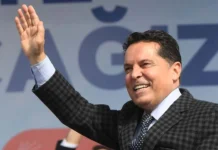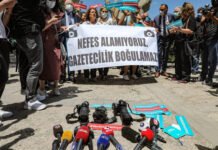Fuat Oktay, Turkey’s former vice president and current ruling party MP, on Wednesday denied allegations that he received $50 million in bribes from a mafia group to protect their assets in the country and accused the journalist who broke the story of being a “terrorist,” Turkish Minute reported.
The allegations came to the fore after investigative journalist Cevheri Güven released audio recordings featuring a former member of the mafia group.
Halil Falyalı, who owned several casinos and hotels in the Turkish Republic of Northern Cyprus (KKTC), died in an attack in Kyrenia in February 2022. Falyalı had been a fugitive from US authorities, facing charges of money laundering and drug trafficking. Cemil Önal, a former confidant of Falyalı, was recently arrested by Dutch police in connection with the murder.
In the recordings released by Güven, Önal claimed that then-vice president Oktay accepted $50 million in bribes in both İstanbul and Dubai. According to Önal, in exchange for this payment, no extradition requests would be made for the Falyalı family, and their assets in Turkey would remain untouched, especially in light of the ongoing legal proceedings against them.
Selçuk Özdağ, leader of the opposition Felicity Party (SP) and Future Party (GP) joint parliamentary group, brought up the allegations in a parliamentary session on Wednesday.
Oktay, in his response to the allegations, accused Güven, without naming him, of being “a terrorist,” and said he is a member of FETÖ, a derogatory acronym devised by the Turkish government to refer to the Gülen movement, a faith-based group outlawed by Ankara, as a terrorist organization.
Turkish President Recep Tayyip Erdoğan has been targeting followers of the Gülen movement, inspired by Turkish Muslim cleric Fethullah Gülen, since the corruption investigations of December 17-25, 2013, which implicated then-prime minister Erdoğan, his family members and his inner circle.
Dismissing the investigations as a Gülenist coup and conspiracy against his government, Erdoğan designated the movement as a terrorist organization and began to target its members. He intensified the crackdown on the movement following the abortive putsch in 2016 that he accused Gülen of masterminding, a charge that Gülen strongly denies.
Although the Turkish government has classified the movement as a terrorist organization, none of its Western allies have fallen for Ankara’s portrayal and consider the group a civic initiative focused on educational activities. Gülen lives in exile in the United States, which has refused to extradite him to Turkey on the grounds that there is no substantial evidence that he committed a crime.
Since the 2013 corruption probes, members of Erdoğan’s Justice and Development Party (AKP) have responded to serious allegations of massive corruption by pointing the finger at “FETÖ.”
Instead of debunking the allegation for the public, AKP lawmaker Oktay emphasized his commitment to the fight against “FETÖ” and his track record in “fighting terrorism,” including that committed by the outlawed Kurdistan Workers’ Party (PKK). He said he had been targeted by “terrorists” because of his “nationalist” stance in Turkish politics.
Oktay claimed transparency in the handling of his and his family’s assets, saying they can be examined at any time.
The opposition in Turkey has called for transparency. SP lawmaker Özdağ stated that it is essential for public figures like Oktay to disclose their financial assets, including those of their immediate family members, in order to maintain public trust.
Özdağ said he would propose a parliamentary investigation into Oktay’s financial assets.
These allegations have put the spotlight on the problem of corruption in Turkish politics and highlighted the challenges journalists like Güven face when trying to expose corruption and hold those in power to account. Despite the seriousness of the allegations, there was little coverage in the Turkish media, and Oktay responded by accusing Güven of being a terrorist rather than addressing the substance of the allegations.





![[UPDATE] French journalist detained in İstanbul during protests released](https://stockholmcf.org/wp-content/uploads/2026/01/raphael_boukandra-218x150.jpg)









